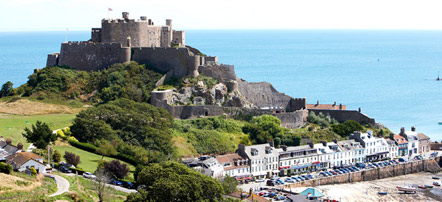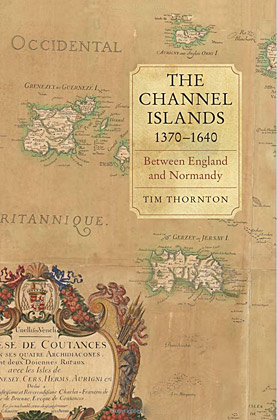Channel Island stories
Tue, 12 Jun 2012 12:20:00 BST
Professor’s book shows how history of the Channel Isles feeds into debates about Britishness

NOT for decades has there been a major history of the Channel Islands before the modern period. Now one has appeared, and although it is tightly focussed on the bailiwicks of Jersey and Guernsey over the course of four turbulent centuries, the book’s author, Professor Tim Thornton (pictured), of the University of Huddersfield, believes that his findings and analysis have great relevance to the rest of Britain and to contemporary debates about national identities and devolution.
The publication of The Channel Islands, 1370-1640: Between England and Normandy is a significant event in Jersey and Guernsey. Book launches are to be attended by leading dignitaries and politicians. During the course of his researches and writings, Professor Thornton has become a widely-known and respected figure in the isles, being granted access to privately-held archives and documents.
He has even been cited during recent vexed debates about the islands’ VAT status, with his 2004 book The Charters of Guernsey being quarried for evidence.
His new book deals initially with a period of medieval history when the French attempted – sometimes successfully – to wrest control of the islands from the English crown.
The islands were also at the forefront of the attempts by the English kings in the fourteenth and early fifteenth centuries to maintain and extend their dominions in France. During the Wars of the Roses and the early Tudor period the Channel Islands frequently provided a refuge for plotters and they were strategically important during the continental wars waged by Elizabeth I.
“But the major thesis of the book is that far from being drawn ever closer into the orbit of English or British power and into the mechanisms of English or British government and justice, the islands maintained a significant degree of distinctiveness,” says Professor Thornton.
This finding has resulted in his work receiving a generally warm welcome in the Channel Islands themselves.
“They consider themselves to be distinctive and different, so they are responsive to the kind of argument that I make. They also emphasise very much their loyalty to the English crown, tending to claim a consistent loyalty to the English crown since 1204, when King John lost control of Normandy.”

King John built the royal castle of Mont Orgueil on a rocky promontory at Gorey to show the French that he had a stong grip on Jersey.
However, Professor Thornton acknowledges that he might win less favour from his Channel Islands readers when he shows that the possibility of allegiance towards Normandy and indeed France remained real for several centuries.
For example, in the 1460s the Normans gained control of Jersey, with the active support of at least some of the islanders. And the prospect of the French regaining control remained a real prospect well into the seventeenth century.
“They don’t necessarily like that argument!” says Professor Thornton. “I am saying that they were not always as loyal to the English crown as some want to think they were!”
The wider significance of Professor Thornton’s new book is to be found in his motivation for writing about the Channel Islands in the first place. As an historian – with particular expertise in the Tudor period – he has specialised in researching ‘peripheral’ areas of England and Britain, distant from the centre of royal power, and how they maintained their distinctive identities. Cheshire, Durham, Wales and the Isle of Man are among the territories he has investigated.
Professor Thornton has therefore played a central role in revising an orthodox interpretation of history, which states that from the sixteenth century onwards, stemming from administrative reforms during the reign of Henry VIII, the English realm and the other territories its king controlled became much more centralised, with most aspects of local distinctiveness being eradicated.

In the wake of his work on Cheshire, Durham, Wales, the Isle of Man and now the Channel Islands, it is becoming much harder for historians to argue that point, claims Professor Thornton.
“If there was a move towards much greater central control, it was much more complicated than previously though and there is now much greater recognition of continuing diversity within the territories controlled by the English.”
It is a view still considered to be controversial by some.
“But I am hoping that the book about the Channel Islands will be another nail into the coffin of the traditional interpretation,” says Professor Thornton
The nature of the British identities
His views have relevance to more than the specialist field of Tudor historiography. In a current political climate which questions the survival of the UK and debates the nature of British identities, Professor Thornton’s long view is valuable.
He has shown that the diversity within Britishness, so pronounced in the present century, is nothing new.
“The drive towards uniformity and centralisation is one that has been considerably over-emphasised by historians and, for that matter, by nationalists,” he says.
“Within Wales, Ireland and Scotland nationalists have often been very keen to emphasise that the English state has been domineering and controlling, because that has helped them to justify their argument for separation.
“But I don’t believe that the histories of the different communities and territories in the British Isles actually bear out that view. The kind of diversity that we see today is not something that is just a product of the Windrush Generation or some kind of post-Second World War settlement. There are much deeper roots to diversity within Britishness.
“The extraordinary thing about the Channel Islands is that they sit between Englishness and Frenchness. The degree to which Norman French culture can be part of an island which is subject to the British crown raises a whole range of questions about not just what lies within Britishness but how Britishness relates to the rest of Europe.”
- The Channel Islands, 1370-1640: Between England and Normandy, by Tim Thornton, is published by Boydell and Brewer.







